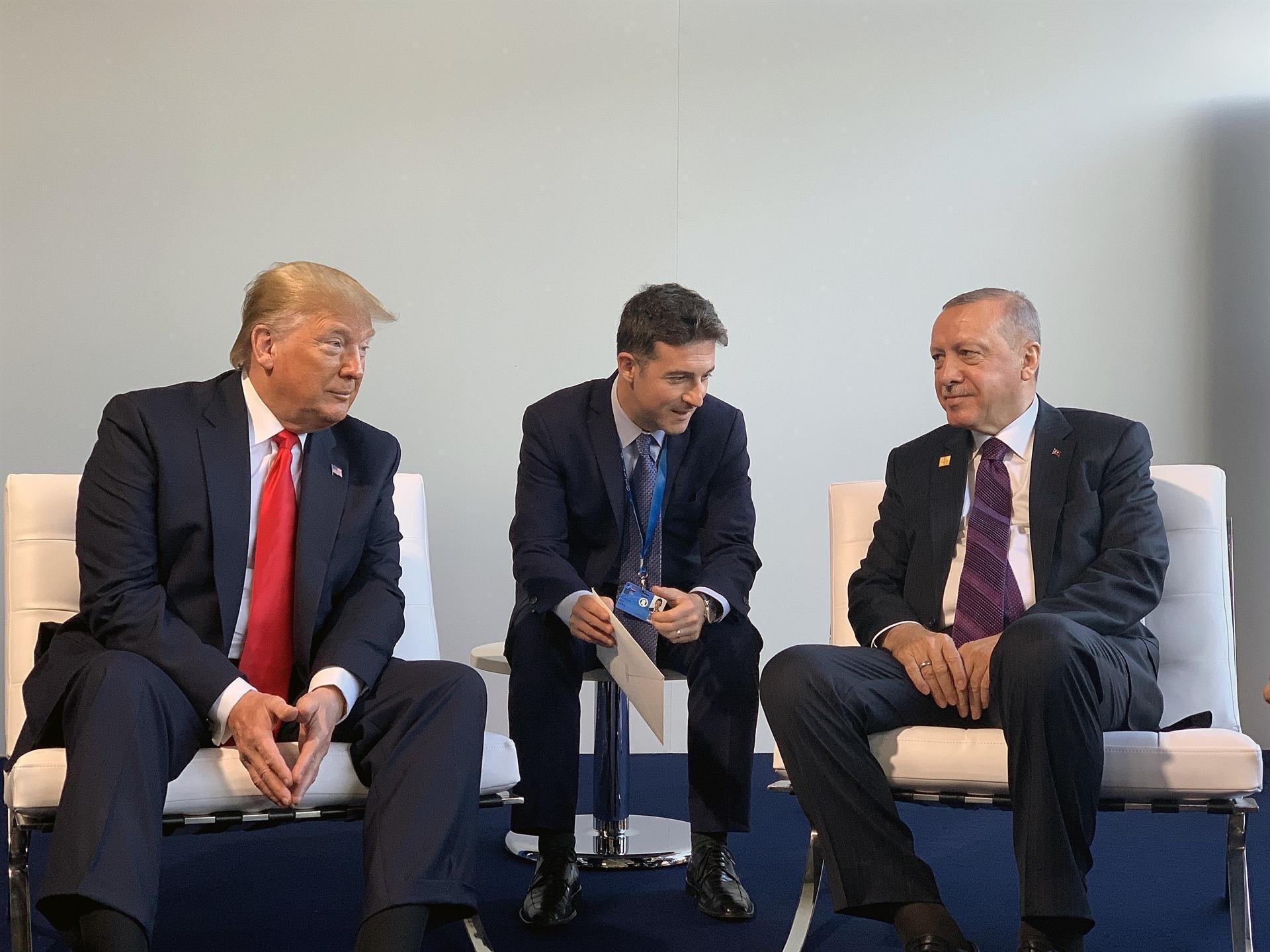
Turkish President Recep Tayyip Erdoğan met with his U.S. counterpart Donald Trump on Dec. 4, on the sidelines of the NATO leaders' summit in London.
The two leaders met after the main session of the NATO leaders' summit.
The closed-door meeting took about half an hour.
Turkish Foreign Minister Mevlüt Çavuşoğlu, Finance Minister Berat Albayrak, Defense Minister Hulusi Akar, former Prime Minister Binali Yıldırım and Presidential Spokesperson İbrahim Kalın were also present at the meeting.
The leaders' summit began with statements stressing solidarity and unity in the alliance.
“NATO remains the only platform where North America and Europe discuss, decide, and take actions together every day to protect almost 1 billion people,” said Jens Stoltenberg, NATO's secretary-general, in his opening speech to the summit.
“So, whatever our differences, we will continue to unite around our core task to defend one another, all for one and one for all,” he added.
Stoltenberg also said: “NATO is the most successful alliance in history because we have changed as the world has changed.”
Also speaking at the summit, British Prime Minister Boris Johnson said: “The fact that we live in peace today demonstrates the power of the simple proposition at the heart of this alliance: that for as long as we stand together, no one could hope to defeat us -- and therefore no one will start a war.”
Referring to Article 5 of the NATO charter -- the collective defense section -- Johnson said: “If any one of us is attacked, all of us will go to their defense.”
“If NATO has a motto, it is: One for all, and all for one,” he added.
Stoltenberg also said that since 2016, the European allies and Canada have been boosting their defense budgets -- addressing a frequent complaint by U.S. President Donald Trump.
“They have added $130 billion to their defense budgets. This is unprecedented. It is making NATO stronger,” he said.
“For the U.K.'s part, we spend over 2 percent of GDP on defense,” Johnson also said.
Earlier on Dec. 4, Stoltenberg said that the leaders will address a wide range of issues including “the fight against terrorism, arms control, our relationship with Russia, and for the first time in NATO's history we will also sit down with the NATO leaders and address the rise of China.”
"NATO is the most successful alliance in history because we have been able to change again and again, when the world is changing," Stoltenberg said in a doorstep statement while heading to Dec. 4' meetings.
On Turkey's opposition to increased NATO deployments in the Baltics, Stoltenberg said: "I'm confident that we will be able to also find a solution to the issue related to the updating the revised defense plans."
"We have plans in place to protect all NATO allies, including, of course, the Baltic countries and Poland. And more than that, we have not only plans but also forces. And for the first time in our history, we have combat troops deployed to the Baltic region," he added.
Stoltenberg also said he spoke to Turkish President Recep Tayyip Erdoğan and was working on a solution to the matter.
Reluctant to back NATO defense plans for Poland and the Baltics ahead of the summit, Turkey has taken issue with the alliance's failure to recognize the threat it faces in northern Syria from the YPG/PKK terror group along its southern border.
European, Turkish leaders agree on fighting terror 'in all its forms'

"NATO must act in a way that will meet the concerns of all allies. What is wanted for the Baltics should be wanted for us too," Turkish Foreign Minister Mevlüt Çavuşoğlu said last week.
Turkey on Oct. 9 launched Operation Peace Spring to eliminate YPG/PKK terrorists from northern Syria east of the Euphrates River in order to secure Turkey’s borders, aid in the safe return of Syrian refugees, and ensure Syria’s territorial integrity.
The U.S.-backed SDF, a group dominated by the YPG, has been controlling some 28 percent of the Syrian territories, including the most of the 911-kilometer-long Syria-Turkey border.
Turkey deems the YPG the Syrian offshoot of the illegal PKK, which is listed as a terrorist organization also by the United States and the EU.